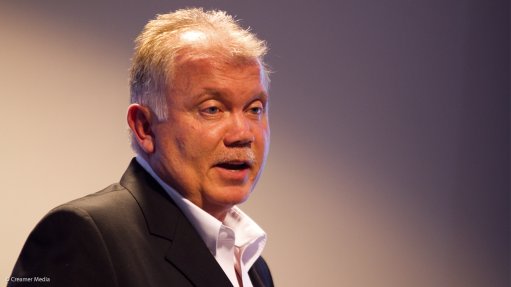
AECI CEO Mark Dytor
Photo by: Duane Daws
The disposal of the bulk of South Africa-based explosives and chemicals company AECI’s surplus property assets in Modderfontein, Gauteng, for over R1-billion is expected to generate R14-billion in direct and indirect benefits for the national economy over a 15-year project life cycle.
This was according to a high-level economic impact study undertaken by the Stellenbosch University’s Bureau for Economic Research, which indicated that the implementation of Modderfontein’s previously approved spatial development framework would cost about R77-billion.
The study also revealed that there was capacity to build 33 000 houses and create 22 000 jobs, 65% being semiskilled and unskilled, while R1-billion in rates and taxes would be generated for local government.
AECI CEO Mark Dytor said at a media briefing on Tuesday the company’s disposal of the land was in line with its strategy to focus on its core business, adding that the purchase of the land by Chinese diversified property development company Shanghai Zendai, which is listed on the Hong Kong Stock Exchange, was one of the largest bulk urban property transactions in South Africa; a significant foreign direct investment. This was also Shanghai Zendai’s first development in South Africa.
The transaction involved the acquisition of about 1 600 ha of land and the buildings thereon, as well as property development business Heartland Properties and investment holding company AECI Real Estate (ARE). Employees involved in Heartland’s Modderfontein development activities would be transferred to Shanghai Zendai.
AECI CFO Mark Kathan explained that the transaction was expected to be effective July 31, 2014, by which time land worth R513-million would be transferred to Shanghai Zendai. Thereafter, AECI would receive the full cash payment of R1.06-billion and would have a maximum of 42 months to transfer the remaining land.
In addition to the transaction costs, Shanghai Zendai would be responsible for reimbursing AECI for improvement costs and value-added tax and interest thereon, incurred by Heartland Properties and ARE on the acquisition assets from September 1, 2013. This was expected to amount to a maximum of about R227.07-million.
The AECI board had not finalised how it would redeploy the proceeds realised from the sale of its surplus assets to enhance stakeholder value. The unlocking of value in land assets could translate to the redeployment of the proceeds to AECI’s core explosives and speciality chemicals businesses, or special dividends or share buy-backs, Kathan added.
Meanwhile, AECI reported that, given the favourable location of the acquisition assets, Shanghai Zendai intends to develop the available land into residential, commercial and retail developments.
Shanghai Zendai chairperson and founder Dai Zhikang said at the media briefing that he was devoted to the development of the land for the next 15 to 20 years. The Modderfontein acquisition would be developed to include a trade and finance centre, industry development to create employment opportunities, as well as the development of a conference and exhibition centre, an African cultural centre for tourists, an education and training centre and a sports centre, while the majority of the land would be used to build family housing.
AECI would retain about 1 300 ha of land at Modderfontein for current and future operational requirements, and future disposals. The company would also retain the 275 ha Modderfontein Reserve, zoned as private open space.
It would also continue to mange the land and buildings it owned in Somerset West, in the Western Cape, and Umbogintwini, in KwaZulu-Natal.
AECI agreed to provide Shanghai Zendai with a right of first refusal to acquire certain remaining Modderfontein assets held by AECI for ten years.